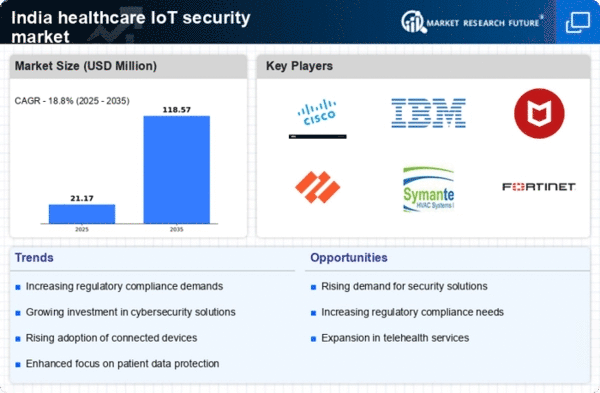Rising Cybersecurity Threats
The healthcare iot-security market in India is experiencing heightened concern due to the increasing frequency and sophistication of cyberattacks. With the proliferation of connected medical devices, the potential for breaches has escalated, prompting healthcare organizations to prioritize security measures. Reports indicate that nearly 60% of healthcare organizations in India have faced cyber incidents in the past year, underscoring the urgent need for robust security frameworks. This trend is likely to drive investments in advanced security solutions, as stakeholders seek to protect sensitive patient data and maintain compliance with regulatory standards. The growing awareness of these threats is fostering a proactive approach to cybersecurity, thereby propelling the healthcare iot-security market forward.
Government Initiatives and Support
The Indian government is actively promoting the adoption of digital health technologies, which inherently includes the healthcare iot-security market. Initiatives such as the National Digital Health Mission aim to enhance healthcare delivery through technology, while also emphasizing the importance of data security. As the government sets forth guidelines and frameworks for secure health data management, healthcare providers are compelled to invest in security solutions to align with these regulations. This governmental push not only fosters a conducive environment for innovation but also stimulates market growth, as organizations recognize the necessity of safeguarding patient information in a digitally transformed landscape.
Integration of Artificial Intelligence
The integration of artificial intelligence (AI) in healthcare is transforming the landscape of the healthcare iot-security market. AI technologies are being utilized to enhance security protocols, enabling real-time threat detection and response. By analyzing vast amounts of data, AI can identify anomalies that may indicate security breaches, thereby allowing for timely interventions. This technological advancement is expected to attract investments, as healthcare organizations recognize the potential of AI to bolster their security frameworks. The growing reliance on AI-driven solutions may lead to a paradigm shift in how security is approached within the healthcare sector, further propelling the healthcare iot-security market.
Increased Patient Awareness and Advocacy
Patient awareness regarding data privacy and security is on the rise in India, significantly impacting the healthcare iot-security market. As individuals become more informed about their rights concerning personal health information, they are demanding greater transparency and security from healthcare providers. This shift in consumer expectations is prompting organizations to enhance their security measures to maintain trust and comply with emerging standards. Surveys indicate that over 70% of patients express concern about the security of their health data, which is likely to drive healthcare providers to invest in more robust security solutions. Consequently, this growing advocacy for data protection is expected to stimulate growth in the healthcare iot-security market.
Growing Demand for Remote Patient Monitoring
The healthcare iot-security market is witnessing a surge in demand for remote patient monitoring solutions, driven by the increasing prevalence of chronic diseases in India. As healthcare providers adopt IoT devices to monitor patients outside traditional clinical settings, the need for secure data transmission becomes paramount. A report suggests that the remote patient monitoring segment is expected to grow at a CAGR of 25% over the next five years. This growth trajectory indicates a significant opportunity for security solutions tailored to protect the integrity and confidentiality of patient data. Consequently, the healthcare iot-security market is likely to expand as organizations seek to implement secure remote monitoring systems.
















